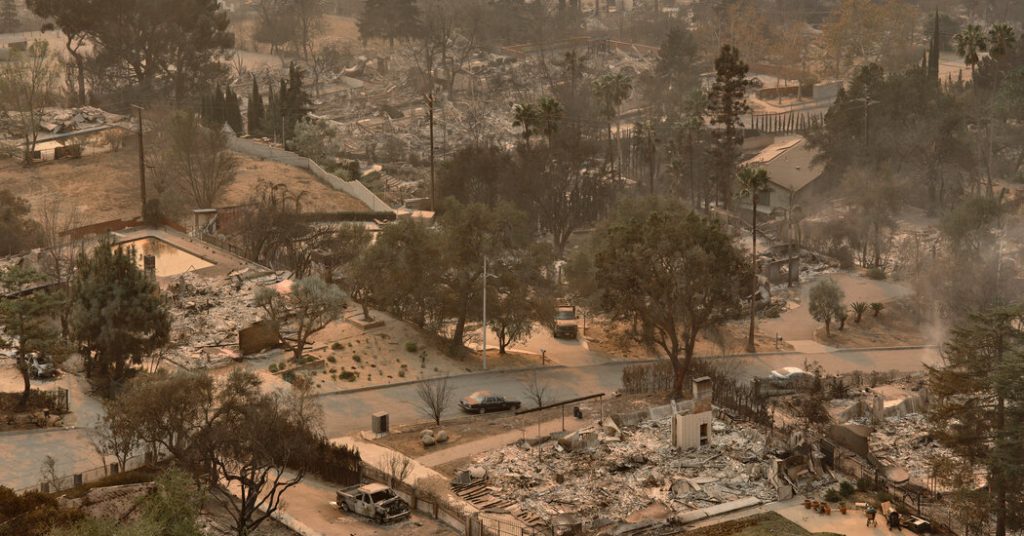The morning sun cast long shadows across Altadena, California, a picturesque town nestled against the foothills of the Angeles National Forest. For Anthony Mitchell, a resident of Terrace Street, it was a Wednesday that began like any other. He called his daughter, Hajime White, to reassure her that he was safe amidst the growing concern over a wildfire ignited in the nearby forest. He’d called for help and was patiently awaiting evacuation. His modest white house, trimmed in cheerful green, with its thriving garden and towering trees, seemed a world away from the encroaching danger. Yet, moments later, a chilling sight caught his eye. The flames, propelled by fierce winds sweeping down the mountains, had reached his yard. “Baby, I got to go,” he told his daughter, his voice laced with urgency, “The fire just got in the yard.”
Mr. Mitchell’s situation was particularly precarious. He relied on a wheelchair following a leg amputation the previous year, a consequence of his diabetes. Adding to the complexity, one of his sons, Justin, a man in his thirties, had cerebral palsy and was bedridden. Their care usually fell to Mr. Mitchell’s other son, Jordan, also in his thirties, who worked alongside a team of healthcare professionals. However, fate had dealt a cruel blow – Jordan was hospitalized with sepsis. Though several cars sat idle in the driveway, Mr. Mitchell couldn’t drive them. As the fire relentlessly advanced, no ambulance arrived to offer a lifeline to the trapped father and son.
He knew time was running out. He looked at Justin, his son lying helpless in his bed, unable to move, unable to escape the rapidly approaching inferno. The fear that gripped him wasn’t for himself, but for his son. His heart ached with the desperation of his predicament. He had called for help, but help seemed an eternity away. He tried to think clearly, to strategize, to find a way out. However, the encroaching smoke and the roar of the approaching flames made coherent thought almost impossible.
The intense heat began to warp the windows, the glass cracking and popping under the stress. The air grew thick with smoke, making it difficult to breathe. The flames licked at the walls of the house, painting them with an eerie orange glow. The roar of the fire was deafening, a monstrous sound that echoed the terror in Mr. Mitchell’s heart. He knew he couldn’t stay, yet leaving Justin behind was unthinkable.
He looked around the room, his eyes darting from one object to another, searching for something, anything, that might help. His gaze landed on a heavy blanket. In a surge of adrenaline, he grabbed the blanket and wrapped Justin tightly within its folds. He knew it wouldn’t offer much protection, but it was all he had.
With every ounce of strength he could muster, he hoisted Justin into his arms. The weight was immense, and each step was agony, but the thought of leaving his son to face the fire alone spurred him onward. He stumbled through the smoke-filled house, the heat intensifying with each passing moment. He made his way towards the back door, hoping that it would lead him away from the inferno’s immediate path.
Stepping outside, he was met with a wall of heat and smoke. He could hear the crackling of flames consuming his home, feel the heat scorching his skin. He pushed onward, his eyes barely open, his lungs burning with each ragged breath. He knew he had to reach safety, not just for himself, but for the precious life he held in his arms.
The narrative of Anthony Mitchell highlights the devastating impact of natural disasters on vulnerable populations. It underscores the anxieties and fear experienced by those who, due to physical limitations or circumstance, are unable to quickly evacuate danger zones. It’s a sobering reminder of the urgency for comprehensive disaster preparedness plans that address the specific needs of individuals with disabilities and ensure timely access to emergency services for all. The fate of Anthony and Justin Mitchell remained unknown as firefighters battled the blaze. Their story serves as a poignant testament to the courage and love that can flourish even amidst the most dire circumstances.


